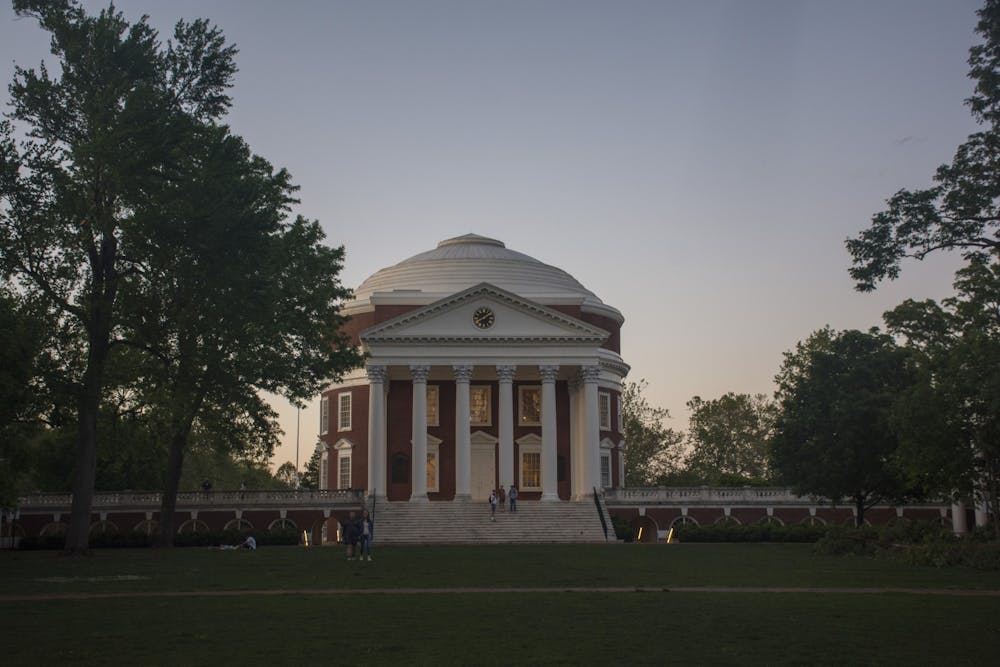University leadership detailed isolation guidelines for students who test positive for COVID-19, announced a temporary ban on food and beverages at events and outlined other plans for the spring semester in an email sent by Provost Liz Magill and Chief Operating Officer J.J. Davis Friday.
“We are very excited to kick this semester off and optimistic about the experiences we can share living, learning and working together on Grounds,” Magill and Davis said. “This virus will pose challenges this semester. But we, as a community, have the capacity to do the right things to keep ourselves and others safe and make the most of this opportunity to be here on Grounds.”
The updates come amid a surge in cases locally and nationally due to the omicron variant. Per the University’s COVID-19 tracker, there are 649 active cases of COVID-19 in the University community, 233 of which are students and 416 of which are faculty and staff. Jan. 6 and Jan. 11 saw 125 and 76 new cases, respectively, and marked the highest single-day caseloads since an outbreak of cases occurring between Feb. 15 and Feb. 18 of last year.
In response to this rise, the University recently pushed up its deadline for students, faculty and staff to upload proof of having received a booster shot. Approximately 96.6 percent of University students were fully vaccinated at the start of the fall semester. In the Blue Ridge Health District, 72 percent of individuals have received at least one dose of the vaccine and 65.6 percent of individuals are fully vaccinated. In addition to those fully vaccinated, 34.4 percent have been vaccinated with a third booster dose.
The new spring isolation policy will shorten the recommended quarantine and isolation period for those with mild infections from 10 days down to five days for those who are up to date on vaccinations and either no longer have — or have receding — symptoms. The policy is in line with guidance from the Centers for Disease Control and Prevention and was made due to research that shows that people with COVID-19 are most infectious in the early days of the course of infection.
Students who have had their booster shot are not required to quarantine if exposed to the virus through close contact, but they do need to wear a mask around others for 10 days while monitoring their health for symptoms of COVID-19.
“Given the contagiousness of omicron, it is likely that many members of our community will contract a mild case of COVID-19 this semester,” Magill and Davis said. “While we will all continue to do everything we can to limit the spread of the virus, the risks of serious illness for vaccinated, boosted and healthy people have never been lower, particularly in relation to the risks for the unvaccinated or those who have chronic conditions.”
Hospitalizations at U.Va. Health are at an all-time high — there are currently 107 individuals hospitalized for COVID-19, with 14 admitted Thursday.
If possible, Magill and Davis said students living on and off Grounds who test positive should plan to isolate in place due to limited space in University isolation facilities. Limited isolation space will be prioritized for students who live in hall-style residence halls. Currently, quarantine inventory is at zero percent capacity, while isolation beds are at two percent capacity.
While University leadership did not institute any gathering size restrictions, community members are strongly encouraged to avoid organizing or attending large indoor events, especially ones where mask compliance may be low or where the vaccination status of the crowd is unknown. The food and beverage ban includes athletic competitions and will be in effect from Jan. 17 to Feb. 4 to ensure that attendees are wearing masks the entire time they are around others.
The University’s indoor mask requirement will remain in place, though Magill and Davis encouraged community members to wear a mask when in Charlottesville whenever indoors, regardless of whether the space is operated by the University or not. Due to the high contagiousness of the omicron variant, masks will be available for students and community members in scattered public areas throughout Grounds as well as outside of classrooms.
“Generally, we hope you will continue to be good neighbors by taking extra precautions to avoid spreading the virus to people in the Charlottesville/Albemarle community,” Magill and Davis said.
University leaders decided to retain last semester’s testing policies, which require weekly prevalence testing for unvaccinated students, faculty and staff. Asymptomatic students, faculty and staff may choose to schedule COVID-19 tests through Time2Test.
Asymptomatic testing is currently located in the basement of Newcomb Hall by appointment only Monday, Tuesday and Thursday 8 a.m. through 4:30 p.m. and Wednesday 7:30 a.m. through 4:30 p.m. Asymptomatic employee testing is available at the Jefferson Park Medical Office Building on Tuesdays and Thursdays from 7 a.m. through 9 a.m. Students experiencing symptoms of COVID-19 should schedule testing through their HealthyHoos portal, whereas faculty members experiencing possible COVID-19 symptoms should contact Employee Health.
Last spring, the University mandated weekly prevalence testing for all students. Students were assigned a testing appointment time and location — either the Central Grounds Parking Garage, Scott Stadium, The Park at North Grounds or the Health Sciences Library — through Time2Test. Faculty, staff and students could also undergo voluntary asymptomatic testing during walk-in testing hours from 8 a.m. to 4:30 p.m. at Scott Stadium and the Emmet/Ivy parking garage.
As students arrive in Charlottesville this week, Magill and Davis encouraged symptomatic individuals to test at home prior to returning, should they have access.
“We recognize that limited resources may make this difficult in many areas, but if you are able, please take this extra precaution to test before you arrive,” Magill and Davis said. “If you are unable, and you are symptomatic, please sign up for a test as soon as you arrive.”







